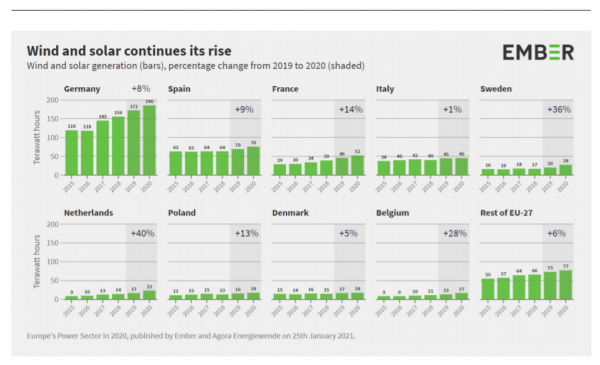In 2020, renewable energy accounted for 38% of European electricity (34.6% in 2019), surpassing fossil fuel power generation for the first time, and the latter dropped to 37%. This is an important milestone in Europe's clean energy transition. At the national level, Germany and Spain (and the United Kingdom) also achieved this milestone for the first time.
However, at this rate, the transition from coal to clean energy is still too slow to reach the 55% greenhouse gas emission reduction target by 2030, and climate neutrality by 2050. Wind and solar power generation must be nearly tripled in order to reach the European 2030 Green Agreement target: an average annual growth rate of 38 TWh from 2010 to 2020, and an average annual growth rate of 100 TWh from 2020 to 2030.
Dave Jones, Ember’s senior power analyst and the lead author of the report, said in a statement: “The rapid growth of wind and solar energy has forced coal production to fall, but this is only the beginning. Europe is relying on wind and solar energy. To ensure that by 2030, not only will coal power generation be phased out, but natural gas power generation will also be phased out and replaced by closed nuclear power plants, while meeting the growing power demand for electric vehicles, heat pumps and hydrogen electrolyzers."
According to the report, electricity demand in Europe has fallen by 4% in 2020. The report pointed out that since 2015, Europe’s electricity emissions have dropped historically, and the cleanliness has increased by 29%. Patrick Graichen, director of Agora Energiewende, said that the pandemic has helped reduce electricity demand, but "the economic recovery after the pandemic must not slow climate action." "Therefore, we need strong climate policies-such as green agreements-to ensure progress."

According to the report, leaders in the field of wind and solar power have shown that if there is sustained political will, everything can be achieved, while some countries are still lagging behind despite having very good solar and wind power conditions. See the chart above. “In 2020, 62% of Denmark’s electricity comes from wind and solar power, almost twice that of Ireland. Germany ranks third, and Spain surpasses Portugal to rank fourth. Seven countries-Portugal, Romania, Austria, Italy, The Czech Republic, Slovakia and Bulgaria-almost no growth since 2015, some of these countries have very good solar and wind power conditions."
However, there is good news. In 2020, coal power generation has fallen by 20% and is now half of 2015. The report stated: "In 2020, coal power generation-including hard coal and lignite-will drop to 365 TWh, a 48% drop since 2015. This is a remarkable achievement, equivalent to an annual reduction of approximately 320 million tons of carbon dioxide It accounts for 7% of European greenhouse gas emissions in 2020. In 2020, brown coal power generation has fallen by 18%, which is the largest decline since 2000. In 2020, coal will only account for 13% of European electricity. According to the influence of the European Commission It is estimated that by 2030, coal needs to be reduced to a level close to zero to reach the EU's 55% greenhouse gas emission target."
This is good news, but it does not mean that countries can slow down plans to increase renewable energy in Europe or anywhere else in the world. Renewable energy is developing rapidly. People are worried that they will destabilize the power grid and cause millions of people to lose their power supply. This concern has proven to be unrealistic. The lesson is that renewable energy is real, relevant, and reliable. With appropriate policy commitments, they can liberate mankind from the disaster of air pollution.
Article information source-China New Energy Network
















 RCCN WeChat QrCode
RCCN WeChat QrCode Mobile WebSite
Mobile WebSite